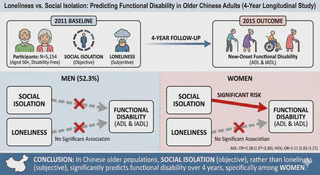Social isolation, loneliness and functional disability in Chinese older women and men: a longitudinal study

Objective: This study investigated whether loneliness or social isolation is associated with the onset of functional disability over 4 years among Chinese older populations.
Setting and Subjects: This study used data from the China Health and Retirement Longitudinal Study (CHARLS). Functional status was assessed by activities of daily living (ADL) and instrumental activities of daily living (IADL). Analyses were conducted with data from two waves (2011 and 2015) and were restricted to those respondents aged 50 and older and free of functional disability at baseline [n = 5,154, mean age (SD) = 60.72 (7.51); male, 52.3%].
Method: Social isolation, loneliness and covariates were measured at baseline. Follow-up measures of new-onset ADL and IADL disability were obtained 4 years later. We stratified the sample by gender, and then used binary logistic regressions to evaluate the associations between baseline isolation, loneliness and new-onset ADL and IADL disability.
Results: For women, baseline social isolation was significantly associated with new-onset ADL (OR = 1.18, 95% CI = 1.07–1.30) and IADL (OR = 1.11, 95% CI = 1.01–1.21) disability; no significant association between loneliness and ADL or IADL disability was found. For men, neither social isolation nor loneliness was found to be significantly associated with ADL or IADL disability.
Conclusion: This longitudinal study found that social isolation, rather than loneliness, was significantly associated with functional disability over 4 years among women (but not men) in China. These findings expand our knowledge about the association between social relationships and functional status among non-Western populations.